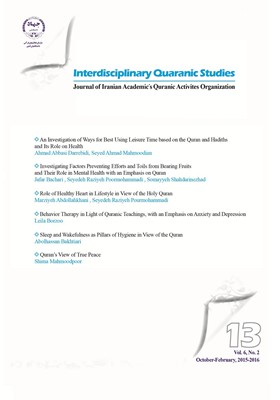Quran’s View of True Peace
Subject Areas : قرآن و روان شناسی
1 -
Keywords: Peace, Quran, Comfort, Spirit and Mind ,
Abstract :
Peace is a rare and precious thing that is among the most fundamental human needs and plays an important role in the happiness and health of individuals and society. Feeling peaceful is a major characteristic of every healthy human being as one can obtain growth and perfection in light of peace and calm. The Holy Quran, as the book of guidance for humanity, provides the best prescription for achieving peace. This paper seeks to describe true peace and correct man’s understanding of it on the one hand, and investigate the factors that contribute to creation and establishment of peace in heart based on divine teachings. To understand the true meaning of peace, one should bear in mind its distinction from comfort. Also, based on the teachings of the Quran, peace is achieved through paying attention to both material and spiritual needs and if there is a conflict between the two, spiritual needs should be given primacy due to the priority of the spirit. There are different words and phrases in the Quran that include the meaning of peace. They include Tathbit, Fuad, Thabat, Rabt-e Qalb, Sukn, and Sakina. A look into these words in the verses of the Quran reveals that the only origin and source of giving peace to hearts is relation with God, the Almighty. In view of the Quran, there are different factors involved in creation and establishment of peace. They include: faith, Zikr (recitation of prayers), correcting one’s view of the world, Tawakkul; (putting one’s trust in God), thankfulness, Taqwa (God-fearing), and performing religious rites.
آصفی، محمد مهدی (1385)، آرامش در آینه وحی، ترجمه علیرضا سروش و محمد حسین سرانجام، قم، موسسه آموزشی پژوهشی امام خمینی#
ابن عاشور، محمد بن طاهر، بی تا، التحریر و التنویر، بیروت، مؤسسه التاریخ#
ابن منظور، محمد بن مکرم(1414)، لسان العرب، دار صادر#
ابوالفتوح رازی، حسین بن علی، 1408 ق، روض الجنان و روح الجنان فی تفسیر القرآن، مشهد، بنیاد پژوهش های اسلامی آستان قدس رضوی#
اشرف صادقی، علی (1392)، فرهنگ جامع زبان فارسی، تهران فرهنگستان زبان و ادب فارسی#
جوادی آملی، عبدالله (1380)،حکمت عبادت، قم، اسراء#
جوادی آملی، عبدالله(1391)، تسنیم، قم، اسراء#
حسینی کوهساری،سید اسحاق(1382) ، نگاه قرآن به فشار روانی، کانون اندیشه جوان#
حسینی همدانی، سید محمد(1404)، انوار درخشان، تهران، کتاب فروشی لطفی#
خاتمی، احمد(1384)، فرهنگ نامه موضوعی قرآن کریم، دفتر فرهنگ اسلامی#
خمینی، روح الله(1378)، موسسه تنظیم و نشر ،آثار امام خمینی #
راغب اصفهانی، حسین بن محمد(1429)، مفردات الفاظ القرآن، طلیعه نور#
شریعتمداری، جعفر(1386)، شرح و تفسیر لغات قرآن بر اساس تفسیر نمونه، بنیاد پژوهشهای اسلامی آستان قدس رضوی#
شریف الرضی ، محمد بن حسین(1388)، نهج البلاغه، ترجمه حسین انصاریان، قم، دارالعرفان#
شفیعی مازندرانی، سید محمد(1384)، سرچشمه های آرامش در روانشناسی اسلامی، ناشر عطر اگین#
صفوی، سید محمد رضا (1389)، ترجمه قرآن بر اساس المیزان، قم، ابنوس#
طباطبائی، سید محمد حسین (1374)،المیزان، ترجمه سید محمد باقرموسوی همدانی، قم، جامعه مدرسین حوزه علمیه قم#
طبرسی، فضل بن حسن، 1372 ش، مجمع البیان فی تفسیر#
طبری، فضل بن حسن(1360)، ترجمه مجمع البیان فی تفسیر القرآن، تهران، انتشارات فراهانی #
طریحی، فخرالدین بن محمد(1375)، تهران، مرتضوی#
فراهیدی، خلیل بن احمد(1409)، کتاب العین، قم، نشر هجرت#
مرکز فرهنگ قرآن، دائره المعراف قرآن کریم(1382)، قم، موسسه بوستان کتاب#
مطهری، مرتضی(1385)، عدل الهی، انتشارات صدرا#
معین، محمد(1371 ) ،فرهنگ فارسی، تهران، چاپخانۀ سپهر#
مکارم شیرازی، ناصر (1361)، تفسیر نمونه، تهران، دارالکتب الاسلامیه#
مکارم شیرازی، ناصر(1389)، تهران، تابان#
نراقی، ملا احمد(1385)، معراج السعاده، موسسه انتشارات هجرت#
هاشمی رفسنجانی، اکبر (1383)، فرهنگ قرآن، قم، بوستان کتاب#

